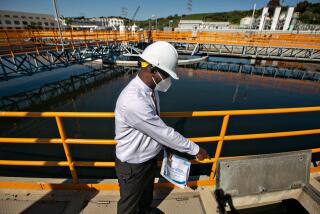Developments in Brief : Salmonella Growing Resistant to Antibiotics
- Share via
Salmonella, the bacteria found in milk and meat products and a common cause of food poisoning, is becoming increasingly resistant to antibiotics and may become difficult to treat in future outbreaks, government researchers warn.
Scientists at the U.S. Centers for Disease Control speculated that one factor may be the growing use of antibiotics in animal feed, although they could not pinpoint the precise reason for the increased resistance.
Dr. Kristine MacDonald, a former center researcher now with the Minnesota Health Department in Minneapolis, said the public need not be alarmed about the development. “There isn’t any impending epidemic or anything.”
About 40,000 cases of salmonellosis are reported to the center every year, but officials estimate that these represent only 10% of all infections. The most common sources of such infections are dairy products, especially raw milk, beef and chicken.
According to MacDonald, strains isolated from humans between 1979 and 1980 were resistant to one or more antibiotics in 16% of the cases, compared to 24% of strains cultured in 1984 and 1985.
Typically confined to the digestive tract, salmonellosis causes diarrhea, abdominal cramps, vomiting and fever. Antibiotic treatment is usually necessary only if the infection spreads to the bloodstream, allowing it to settle in the liver and other organs and cause inflammation and sometimes abscesses.
Most salmonellosis outbreaks are small and associated with contaminated foods at a restaurant or large gathering. But in the spring of 1985, about 17,000 cases in six states were traced to an Illinois farm that had inadvertently mixed raw and skim milk while making a 2% fat mixture.
More to Read
Sign up for Essential California
The most important California stories and recommendations in your inbox every morning.
You may occasionally receive promotional content from the Los Angeles Times.












